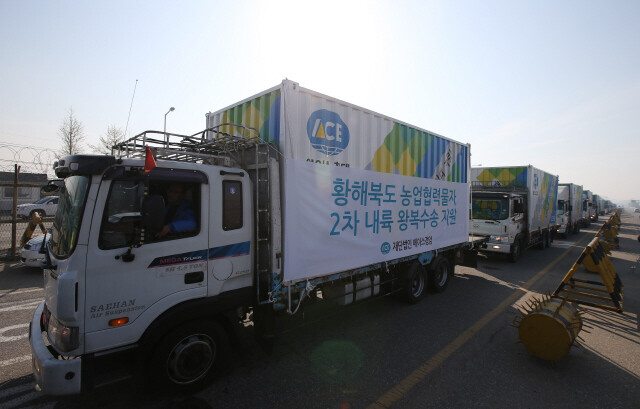hankyoreh
Links to other country sites 다른 나라 사이트 링크
[Editorial] Need to find inter-Korean peace among mixed signals

North Korea is sending mixed signals. Since May, Pyongyang has made a number of unexpected moves that have ratcheted up confrontation with Seoul and increased its international isolation. These moves have included North Korean leader Kim Jong-un’s abrupt cancelation of plans to attend a ceremony marking the 70th anniversary of Russia’s victory in World War II, news reports about an launch test of a submarine-launched ballistic missile (SLBM), rumors about the purging of Minister of the People's Armed Forces Hyon Yong-chol, more strident criticism and bashing of South Korea by various kinds of North Korean organizations and media, including the National Defense Committee and the Committee for the Peaceful Reunification of the Fatherland, and the sudden cancellation of UN Secretary-General Ban Ki-moon’s permission to visit to the Kaesong Industrial Complex.
There is also widespread pessimism among experts on inter-Korean relations about the chances for improving inter-Korean relations in the short term. These experts suspect that internal politics in North Korea have forced the government to take a harder line on its policy toward South Korea and the outside world.
Amid all this, North Korea attracted attention by sending positive signals this past weekend. One such signal was allowing around 30 female peace activists from 15 countries around the world - members of the WomanCrossDMZ group - to cross from North Korea into South Korea on May 24. Setting out in North Korea, the women crossed the military demarcation line and entered South Korea at the Inter-Korean Transit Office at the Gyeongui train line in the city of Paju, Gyeonggi Province.
While they were not able to walk across the border at Panmunjeom as they had initially hoped, there is great historical significance to the fact that women peace activists from around the world were able to “break through” the military demarcation line at a time when military tensions are running high on the Korean peninsula.
Since women inevitably suffer most during a war or other kind of conflict, the fact that it was women who were the catalyst in connecting North and South Korea is necessarily more symbolic and influential than if it had been any other group or individual. We applaud these women’s imagination and courage. The only regrettable thing is that the government was so hung up on formalities that it did not allow them to walk across the military demarcation line or to cross at Panmunjeom.
Another positive signal is the apparent resolution on May 22 of the dispute about increasing wages at the Kaesong Complex, which had been causing friction since February. The dispute was brought to an end when North Korea suddenly accepted South Korea’s proposal to pay wages at the current level until the two sides reach a separate agreement in the near future. This means that the wrangling over wages will not lead to a reduction or interruption of work at the complex.
To be sure, there is no need to draw the hasty conclusion that allowing the female activists to cross the DMZ or bringing the wage dispute at the Kaesong Industrial Complex to an end mean that North Korea has returned to a policy of conciliation. But neither should we disregard these signals just because they are mild.
The governments of North and South Korea need to recognize that moving away from confrontation and toward reconciliation and cooperation is the easiest and most effective way to give both sides a greater voice in the process of tackling the issues facing the Korean Peninsula. We hope that both North and South Korea will make the most of these subtle signals and turn them into an opportunity for inter-Korean reconciliation and cooperation.
Please direct questions or comments to [english@hani.co.kr]

Editorial・opinion
![[Column] Has Korea, too, crossed the Rubicon on China? [Column] Has Korea, too, crossed the Rubicon on China?](https://flexible.img.hani.co.kr/flexible/normal/500/300/imgdb/original/2024/0419/9317135153409185.jpg) [Column] Has Korea, too, crossed the Rubicon on China?
[Column] Has Korea, too, crossed the Rubicon on China?![[Correspondent’s column] In Japan’s alliance with US, echoes of its past alliances with UK [Correspondent’s column] In Japan’s alliance with US, echoes of its past alliances with UK](https://flexible.img.hani.co.kr/flexible/normal/500/300/imgdb/original/2024/0419/2317135166563519.jpg) [Correspondent’s column] In Japan’s alliance with US, echoes of its past alliances with UK
[Correspondent’s column] In Japan’s alliance with US, echoes of its past alliances with UK- [Editorial] Does Yoon think the Korean public is wrong?
- [Editorial] As it bolsters its alliance with US, Japan must be accountable for past
- [Guest essay] Amending the Constitution is Yoon’s key to leaving office in public’s good graces
- [Editorial] 10 years on, lessons of Sewol tragedy must never be forgotten
- [Column] A death blow to Korea’s prosecutor politics
- [Correspondent’s column] The US and the end of Japanese pacifism
- [Guest essay] How Korea turned its trainee doctors into monsters
- [Guest essay] As someone who helped forge Seoul-Moscow ties, their status today troubles me
Most viewed articles
- 1[Column] The clock is ticking for Korea’s first lady
- 2Hong Se-hwa, voice for tolerance whose memoir of exile touched a chord, dies at 76
- 3After 2 months of delayed, denied medical care, Koreans worry worst may be yet to come
- 4[Column] Has Korea, too, crossed the Rubicon on China?
- 5US overtakes China as Korea’s top export market, prompting trade sanction jitters
- 6Samsung barricades office as unionized workers strike for better conditions
- 7[Correspondent’s column] In Japan’s alliance with US, echoes of its past alliances with UK
- 8All eyes on Xiaomi after it pulls off EV that Apple couldn’t
- 9[Correspondent’s column] The US and the end of Japanese pacifism
- 10[Guest essay] How Korea turned its trainee doctors into monsters